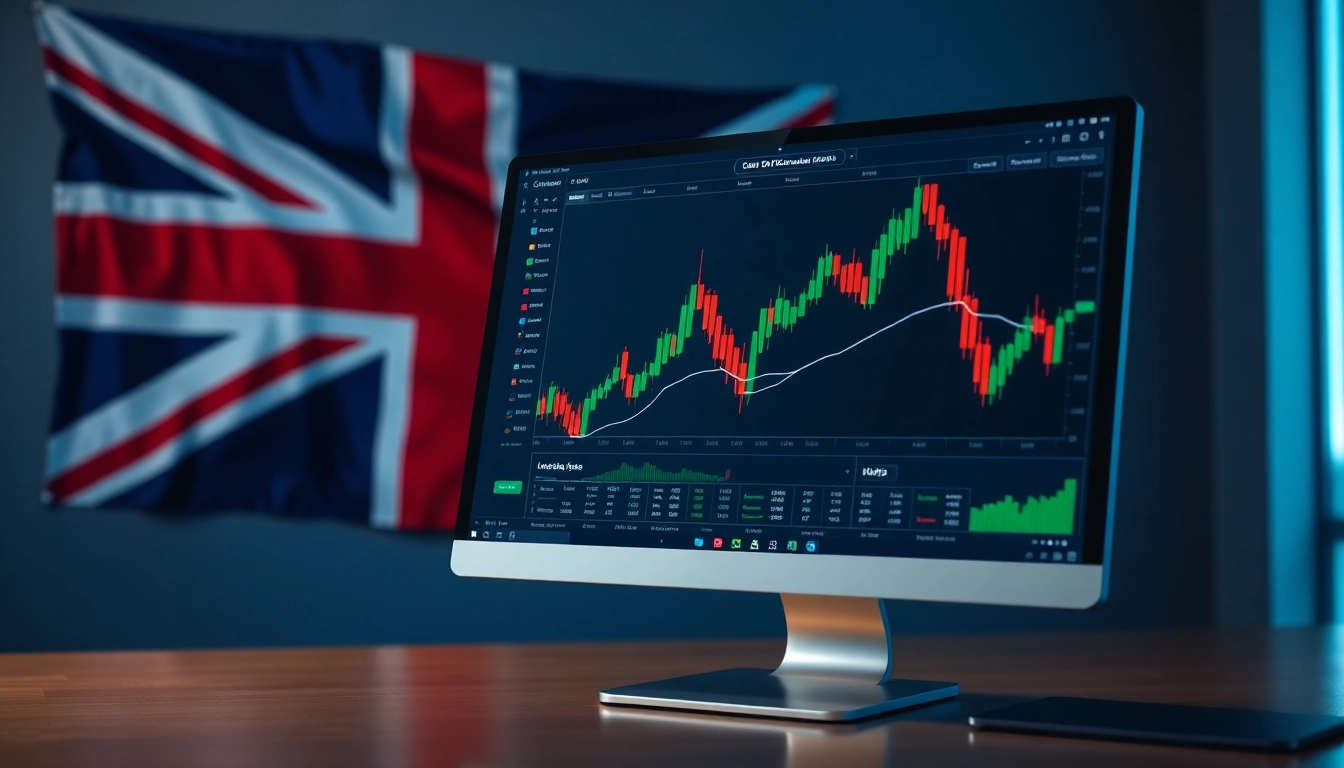Understanding the Basics of Online Trading in the UK
Online trading has revolutionized the way individuals and institutions participate in financial markets, offering unprecedented access, flexibility, and convenience. In the UK, the popularity of online trading continues to surge as more investors seek to diversify their portfolios and take advantage of real-time market opportunities. For newcomers and seasoned traders alike, understanding the fundamental mechanics of online trading is essential to maximize potential returns while managing inherent risks. If you’re looking to get started or improve your existing trading strategy, exploring the intricacies of Online Trading UK can provide valuable insights into the local landscape, regulatory environment, and effective trading tools.
What is online trading and how does it work in the UK?
Online trading involves buying and selling financial assets through internet-based platforms, eliminating the need for physical presence at a trading floor. In the UK, this encompasses a broad range of asset classes including stocks, forex, commodities, cryptocurrencies, and derivatives. Traders access markets through specialized brokerage platforms, which facilitate order execution, real-time data, and analytical tools.
Key components of online trading include account setup, funding, market analysis, and executing trades via user-friendly interfaces. Modern platforms often incorporate advanced features such as real-time charting, automated trading options, and social trading elements, empowering traders with diverse strategies. The ease of access combined with technological innovations allows UK traders to respond swiftly to market movements, making online trading an attractive venture for both individuals and institutions.
Legal regulations and licensing for UK traders
The UK regulatory landscape for online trading is well-developed, guided primarily by the Financial Conduct Authority (FCA). The FCA’s primary aim is to protect consumers, ensure market integrity, and promote fair trading practices. All brokers operating within the UK must hold FCA authorization, which mandates adherence to strict standards concerning transparency, client funds protection, and operational conduct.
For traders, this regulatory framework offers confidence that their chosen brokerage is legitimate and compliant. It’s crucial to verify that a platform is FCA-licensed before depositing funds or executing trades. Additionally, UK traders benefit from the Financial Services Compensation Scheme (FSCS), which provides compensation in the unlikely event of broker insolvency, further enhancing the security of online trading activities.
Key platforms and tools for successful online trading in the UK
Successful online trading hinges on access to reliable platforms equipped with advanced tools. Leading platforms supported in the UK include MetaTrader 4 and 5, TradingView, and proprietary brokerage platforms that offer tailored trading experiences. These platforms provide real-time market data, technical analysis tools, automated trading options, and social trading features that enable collaboration and strategy sharing.
Essential tools for traders include algorithmic trading systems, risk management software, and customizable dashboards that help monitor multiple assets simultaneously. Additionally, integration of economic calendars, news feeds, and sentiment analysis tools can give traders vital insights, enabling quick, informed decisions. Choosing the right combination of platforms and tools is crucial for developing a robust trading strategy aligned with individual goals and risk appetite.
Developing Effective Trading Strategies for the UK Market
Analyzing market trends and data for UK assets
Developing a profitable trading strategy requires a thorough understanding of market trends and data specific to UK assets. Traders should leverage historical data, economic indicators, and geopolitical developments to identify patterns and forecast future movements. Techniques such as technical analysis—using candlestick patterns, moving averages, and momentum indicators—help identify entry and exit points.
Fundamental analysis, focusing on economic data releases like GDP figures, inflation rates, and employment statistics, is also vital in the UK context. Monitoring news pertinent to UK-specific companies and sectors can provide additional trading signals. Successful traders combine these analyses to form a comprehensive view, enabling more accurate predictions and timely trades.
Risk management techniques tailored for UK traders
Risk management is the backbone of sustainable trading. UK traders should adopt techniques such as setting stop-loss and take-profit orders to limit downside and lock in gains. Position sizing—determining the appropriate amount to risk per trade—should align with individual risk tolerance and account size.
In volatile markets, especially in forex or commodities, diversification across different assets can mitigate risk. Using hedging strategies and regularly reviewing trading performance helps identify weaknesses and optimize risk controls. Emphasizing risk-adjusted returns ensures that traders preserve capital and pursue consistent growth over time.
Utilizing leverage and margin responsibly in UK trading
Leverage amplifies trading power but also increases potential losses. In the UK, regulators impose strict limits on leverage ratios—commonly 30:1 for retail forex traders—to protect investors. Responsible use of leverage entails understanding its impacts, using it selectively, and avoiding overexposure. Margin requirements vary across asset classes, and traders must be meticulous about maintaining sufficient margin levels to prevent margin calls.
Educating oneself on leverage mechanics, monitoring account health, and adhering to disciplined trading plans are crucial in leveraging opportunities responsibly. Proper leverage management can significantly improve trading outcomes without exposing oneself to unnecessary financial risk.
Enhancing Your Online Trading Skills and Knowledge
Educational resources and courses available for UK traders
The UK trading community benefits from a wealth of educational resources, ranging from online courses, webinars, and tutorials to comprehensive trading academies. Platforms like Investopedia, Babypips, and broker-sponsored educational portals provide foundational knowledge on trading principles, technical and fundamental analysis, and psychological resilience.
For more specialized learning, many UK brokers offer tailored courses, mentorship programs, and live seminars. Staying updated with new strategies, tools, and market theories enhances skillsets, empowering traders to make smarter, more confident decisions.
Common mistakes to avoid in UK online trading
Experienced traders emphasize avoiding pitfalls such as overtrading, neglecting risk management, and emotional trading. Overtrading often results from chasing losses or attempting to maximize gains impulsively. Inadequate risk controls can lead to substantial capital erosion.
Emotional decision-making, driven by fear or greed, significantly hampers trading discipline. Maintaining a clear trading plan, sticking to predefined strategies, and cultivating patience are vital in preventing these common errors.
Building a disciplined trading routine in the UK environment
Consistency is key to long-term success. Establishing a disciplined routine involves setting daily or weekly trading schedules, conducting pre-trade analysis, and reviewing past performance. Incorporating regular breaks reduces emotional fatigue and improves decision-making quality.
Keeping a trading journal helps track progress, identify patterns, and refine strategies over time. By fostering discipline and continuous learning, UK traders can elevate their trading performance sustainably.
Tools, Platforms, and Resources for UK Traders
Top trading platforms supported in the UK
UK traders have access to a variety of reputable trading platforms. MetaTrader 4 and 5 remain industry leaders due to their reliability, extensive analytical tools, and automated trading capabilities. Additionally, platforms like eToro, IG, and Plus500 offer user-friendly interfaces, social trading features, and comprehensive asset coverage, suitable for traders of all levels.
Choosing the right platform depends on your trading style, asset preference, and desired features. It’s advisable to test multiple platforms via demo accounts to determine the best fit before committing capital.
Using analytics and automation to boost trading success
Advanced analytics, such as sentiment analysis, economic calendars, and AI-based predictions, offer a competitive edge. Automation through Expert Advisors (EAs) or algorithms enables high-speed trade execution and emotion-free decision-making, especially in volatile markets.
Incorporating automation tools requires proper testing and risk controls. Successful traders blend manual analysis with automated systems to optimize timing, manage risk, and seize fleeting market opportunities.
Keeping up with UK financial news and updates
Staying informed about UK-specific economic developments, political events, and regulatory changes is essential. Reliable sources include the Financial Times, BBC Business, and official government releases. Many trading platforms offer integrated news feeds tailored to UK markets, enabling traders to react swiftly to impactful news.
Regularly following these updates enhances contextual understanding and improves decision-making accuracy, thereby fostering more informed trading behaviors.
Measuring Performance and Scaling Your Online Trading Business
Tracking key metrics for UK online trading success
Monitoring performance metrics like win rate, profit factor, maximum drawdown, and risk-reward ratio provides vital insights into trading effectiveness. Keeping detailed records allows traders to identify strengths and weaknesses, adapt strategies, and set realistic goals.
Adjusting strategies based on performance data
Continuous evaluation is essential in dynamic markets. Based on performance data, traders should refine entry and exit criteria, optimize position sizing, and reconsider leverage levels. Data-driven adjustments lead to improved consistency and profitability over time.
Long-term growth and diversification in UK markets
Achieving sustained growth involves diversifying across asset classes, sectors, and trading strategies. Exploring UK equities, FTSE 100 components, forex pairs, commodities, and cryptocurrencies reduces dependency on a single market. Compound growth, reinvestment, and strategic planning enable traders to build a resilient and scalable trading business.



